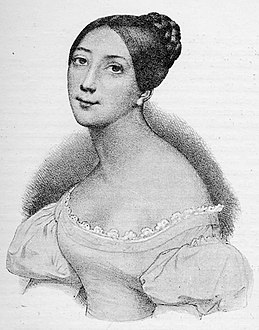I briganti (Mercadante)

I briganti is an opera (melodramma) in three acts by Saverio Mercadante, first performed on 22 March 1836 by the Théâtre-Italien in Paris, with an Italian libretto by Jacopo Crescini based on Schiller’s Die Räuber.[1] The lead roles were written for bass Luigi Lablache, tenor Giovanni Battista Rubini, baritone Antonio Tamburini and soprano Giulia Grisi.[2] The opera did not do well in Paris,[3] and the cast departed for London.[4][5] [6]
Performance history
The opera was also performed in Italian at The King's Theatre in London with the same lead singers, beginning on 2 July 1836; at the Teatro San Benedetto in Venice on 30 September 1836; in Milan on 6 November 1837; in Cagliari, Sardinia, in the autumn of 1837; in Lisbon on 16 September 1838; at the Teatro San Carlo in Naples in the winter season of 1839; in Madrid on 12 December 1839; in Malta in 1840; and in Corfu in 1844. It was revived in Malta in 1886.[4]
It was revived for the Rossini in Wildbad festival in 2012 and an audio recording was issued.[7]
Roles
| Role[8] | Voice type | Premiere cast, 22 March 1836 |
|---|---|---|
| Massimiliano, Count of Moor, a Prince of the Blood Royal | bass | Luigi Lablache |
| Ermano, son of Massimiliano | tenor | Giovanni Battista Rubini |
| Corrado, son of Massimiliano | baritone | Antonio Tamburini |
| Amelia d'Edelreich, niece of Massimiliano | soprano | Giulia Grisi |
| Teresa, confidante of Amelia | mezzo-soprano | |
| Bertrand, a hermit | bass | |
| Roller, a friend of Ermano | tenor | |
| Chorus: Warriors, villagers, women, attendants, pages, domestics, brigands, etc. | ||
- Cast for the 1836 premieres in Paris and London
Recording
- 2012: Bruno Praticò (Massimiliano), Maxim Mironov (Ermano), Vittorio Prato (Corrado), Petya Ivanova (Amelia), Rosita Fiocco (Teresa). Virtuosi Brunensis, conducted by Antonino Fogliani. Live recording at Rossini in Wildbad on 14, 18 and 21 July 2012. Naxos Records.[7]
Notes
- ^ Rose 1992a, 1992b; Wittmann 2001.
- ^ Ripley 1879.
- ^ Rose 1992a; Marek 2013, p. 15.
- ^ a b Loewenberg 1978, columns 779–780.
- ^ 0810886685 In spite of their best efforts, I briganti was a failure, but the experience in Paris was salutary for Mercadante. He changed his style and became the most important composer of the primo ottocento after Rossini, Donizetti, and Bellini and had a considerable influence on the young Verdi. Then, for Rubini, it was off again to the King's Theater in London (that's where the money was!) On April 9, the season opened with La gazza ladra. Other familiar works followed: Mose' in Egitto, I puritani, ...
- ^ Ashbrook 1983, p. 233. "On the strength of these scores Mercadante was invited in 1836 by Rossini to compose for the Theatre-Italien. In the same way that Rossini had offered advice and practical suggestions to Bellini for I puritani and to Donizetti for Marin Faliero, so he performed the same office for Mercadante with I briganti, and it seems indisputable that this experience formed the point of departure for Mercadante's ..."
- ^ a b "MERCADANTE I Briganti", Gramophone (October 2014); WorldCat audio recording bibiliographic entry: I briganti melodramma serio in three parts, OCLC 896737896.
- ^ Libretto for London (1836)
Bibliography
- Ashbrook, William (1982). Donizetti and His Operas. Cambridge: Cambridge University Press. ISBN 9780521235266.
- Loewenberg, Alfred (1978). Annals of Opera 1597–1940 (third edition, revised). Totowa, New Jersey: Rowman and Littlefield. ISBN 9780874718515.
- Marek, Dan H. (2013). Giovanni Battista Rubini and the Bel Canto Tenors: History and Technique. Lanham, MD: Scarecrow Press. ISBN 0810886685.
- Ripley, George; Dana, Charles Anderson, editors (1879). "Mercadante, Saverio", vol. 11, p. 398, in The American Cyclopaedia: A Popular Dictionary of General Knowledge, 2nd edition, revised. New York: D. Appleton.
- Rose, Michael (1992a). "I Briganti", vol. 1, p. 603, in The New Grove Dictionary of Opera, four volumes, edited by Stanley Sadie. London: Macmillan. ISBN 9781561592289.
- Rose, Michael (1992b). "Mercadante, (Giuseppe) Saverio (Raffaele)", vol. 3, pp. 334–339, in The New Grove Dictionary of Opera, four volumes, edited by Stanley Sadie. London: Macmillan. ISBN 9781561592289.
- Wittmann, Michael (2001). "Mercadante, (Giuseppe) Saverio (Raffaele)" in The New Grove Dictionary of Music and Musicians, 2nd edition, edited by Stanley Sadie. London: Macmillan. ISBN 9781561592395 (hardcover). OCLC 419285866 (eBook).
External links
- I briganti: Scores at the International Music Score Library Project
- "The Italian opera at Paris", The Musical World, vol. 1, no. 4 (8 April 1836)
- Libretto for London (1836), in Italian with English translation
- Libretto for Milan (1837), in Italian




